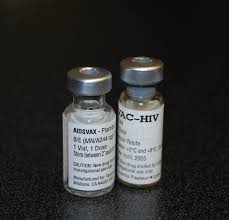Source: Thailand Medical News Sep 20, 2019 5 years, 7 months, 6 days, 19 hours, 41 minutes ago
Results of a study that was conducted in South Africa using the RV144/Thai vaccine regimen that showed modest protection in an efficacy study conducted in Thailand, where clades B and E are prominent indicated significant cellular and antibody responses in study participants with clade C as the dominant circulating strain of HIV.
"Trial Responses Dispels The Notion That Each Strain or Clade From A Specific Region Needs A Separate HIV Vaccine"
The research team evaluated whether the vaccine-induced immune responses would be similar in a South African cohort if immunized with the same RV144 HIV vaccine regimen used in Thailand. The U.S. Army-led RV144 was the first vaccine clinical trial ever to demonstrate any efficacy in preventing HIV. The regimen is a heterologous "prime-boost" combination of two vaccines: ALVAC-HIV and AIDSVAX B/E, based on clades B and E, which demonstrated moderate protection against HIV with a 31.2 percent efficacy.
Dr. Glenda Gray, co-principal investigator of the HIV Vaccine Trials Network (HVTN) commented in an interview with
Thailand Medical News "Vaccine-induced immune responses elicited from this clade B/E-based vaccine regimen induced cross-clade responses in South Africans and, at peak immunogenicity, the South African vaccinees exhibited significantly higher cellular and antibody immune responses than the Thai vaccinees,"
The HVTN 097 study is part of a larger HIV vaccine research endeavor led by the Pox-Protein Public-Private Partnership, or P5—a diverse group of public and private organizations committed to building on the success of the RV144 trial. The P5 aims to produce an
HIV vaccine that could have a significant public health benefit in southern Africa and to advance scientists' understanding of the immune responses associated with preventing HIV infection.
Lt. Col. Julie Ake, principal deputy director of MHRP further commented, "Since 2009, the HIV vaccine field has been building on findings from RV144 to understand and develop improvements in vaccine breadth and duration in order to protect more people for longer periods of time."
The RV144 vaccine regimen in HVTN 097 vaccinees induced a significantly higher CD4+ T cell response rate than seen in the Thai vaccine recipients (RV144=36.4 percent; HVTN 097=51.9 percent), irrespective of age and sex. South African and Thai participants also generated cross-clade antibody responses against HIV clades AE, B and C, which, in a panel of clade C antigens, were also higher and more prevalent in South Africans. In general, cross-clade immune responses were stronger than expected in South Africa. HVTN 097 is a precursor to studies that adapted the RV144/Thai vaccine regimen to be clade C specific, now underway in South Africa (HVTN 702).
Larry Corey, M.D., principal investigator of the HVTN commented, "This breaks open the thought pattern that each region of the world needs a separate type of HIV vaccine based upon their circulating strains,"
A previous clinical trial (HVTN 503/Phambili) conducted in South Africa demonstrated that higher BMI was associated with a reduction in vaccine-induced immune responses. Given the high rates of obesity in South Africa, the
HVTN 097 study team, after stratifying the groups, found that a higher BMI was not associated with a reduced CD4+ T cell and antibody response rate or the strength of the response rate. Notably, CD4 + T cell responses were detected in 100 percent of vaccinees with a BMI greater than 30, giving hope for future HIV vaccine regimens based on the RV144/Thai vaccine regimen.
The research team acknowledge that factors such as race, ethnicity, the microbiome, or genetic factors may have influenced vaccine -induced immune responses in South Africans.
Although there has been major breakthroughs in HIV prevention and treatment, In 2018 alone, there was an estimated 2.5 million people newly infected with HIV. It is estimated that there are about 6,000 new HIV infections around the world each day with the figures ever increasing. Complacency, new sexual behaviour among the younger adults and teens and even a sudden complacency by even Health Authorities is largely to be blame.The urgent pursuit for a safe, effective and scalable HIV vaccine, although a challenging task, is a global imperative.
Reference:
G.E. Gray el al., "Immune correlates of the Thai RV144 HIV vaccine regimen in South Africa," Science Translational Medicine (2019). stm.sciencemag.org/lookup/doi/ … scitranslmed.aax1880
